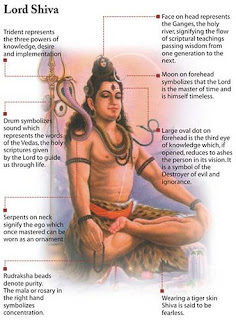Comparison of Hindu and Islamic Practices
Apart from the above, following are some important differences between the two religions, with regard to their respective religious practices.
* Despite the tradition of polygamy, Hindus are now strictly monogamous. Islam permits polygamy.
* Muslims celebrate mainly two festivals, Id al-Fitre and Id al-Adha. Hindus celebrates many festivals throughout the year. They have festivals in every season, for every planetary configuration, auspicious occasion and for every major god or goddess. Perhaps no other religion has so much cause to celebrate as Hinduism. In a way it is a celebration of time itself and the journey of man upon earth. In worldly matters Islam is an austere religion and Hinduism liberal.
* Islam prescribes a specific dress code for Muslims based on the principle of modesty. They are advised not to wear clothes that are too thin or too tight. Women are expected to wear burkha in public. In Hinduism there is no specific dress code either for men or women, except on specific occasions or to perform certain rituals. Widowed women are expected not to wear ornaments or colorful dresses. Obscenity and public nudity are not tolerated.
* Both Hinduism and Islam do not approve of close and intimate mingling of opposite sexes outside marriage and family relationships. Kissing in public is a taboo. Dating is considered both irreligious and immoral. Both religions proclaim marriage as a bond between a man and a woman, established through mutual consent, with God as the witness. In Islamic society there is no disrespect for eunuchs. In fact, in medieval
* Both religions prescribe a code of conduct with regard to food and drinks. For the Hindus the cow and the bull are sacred and should not be slaughtered. So they are forbidden from eating beef. For the Muslims, the pig is an unclean animal. So pork is forbidden. Islam explicitly prohibits intoxicating drinks and substances. As in Judaism, Muslims cannot eat meat unless it is prepared in accordance with prescribed rules.
* In Islam abortion is equated with murder and not permitted unless the mother's life is in danger. In Hinduism also abortion is equated with murder. According to the Vashishta Sutras, "He is called Bhrûnahan who kills a Brâhmana or destroys an embryo (the sex of) which is unknown." The notorious practices of sati (widow burning on the funeral pyre of her husband) and drowning of girl children for economic or religious reasons are now, thankfully, things of the past. Male children usually enjoy more privileges in Hinduism than female children, because of the religious duties assigned to them towards their parents and ancestors and for continuing the family lineage, which is so important for the continuation of dharma upon earth. In Islam the distinction between men and women is mostly social and economic rather than religious in nature.
* Hindu society is characterized by caste system. The distinction is based not so much according to racial or social differences, but birth and family status. In Islam there is no distinction based on the birth or family status of a person. All believers are equal and equally dearer to Allah. If there is any distinction among people, it is between believers and non-believers, those who acknowledge Allah and His messenger and those who do not and the pious and the evil.








Comments
Post a Comment